新概念英语第二册Lesson 68 Persistent 课件 (共20张PPT)
文档属性
| 名称 | 新概念英语第二册Lesson 68 Persistent 课件 (共20张PPT) | 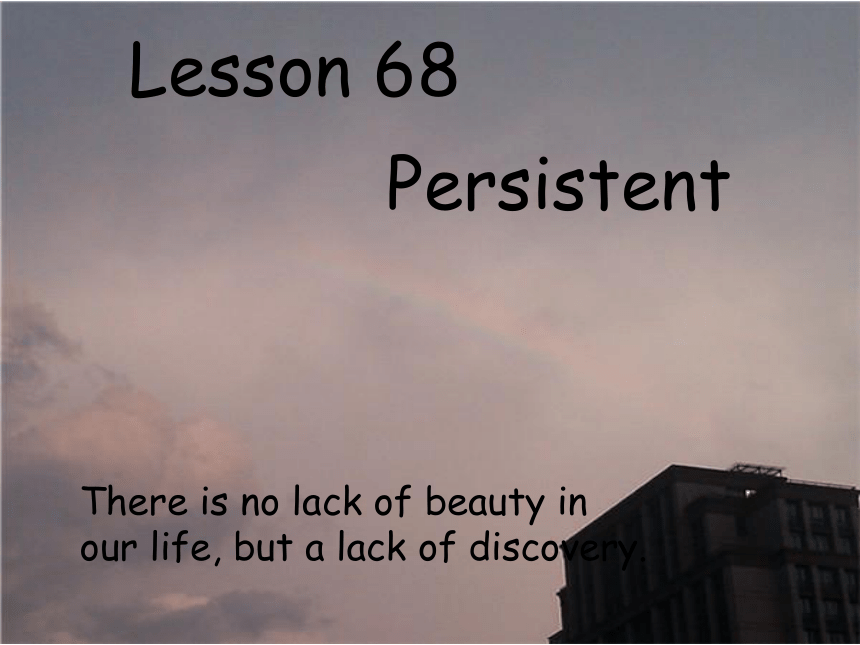 | |
| 格式 | ppt | ||
| 文件大小 | 601.5KB | ||
| 资源类型 | 教案 | ||
| 版本资源 | 新概念英语 | ||
| 科目 | 英语 | ||
| 更新时间 | 2023-10-07 08:57:55 | ||
图片预览

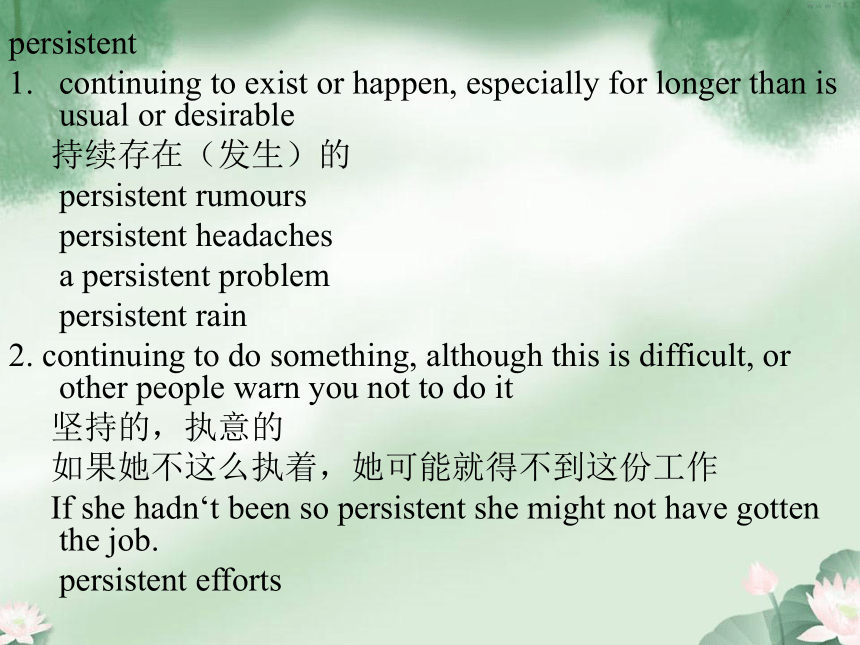

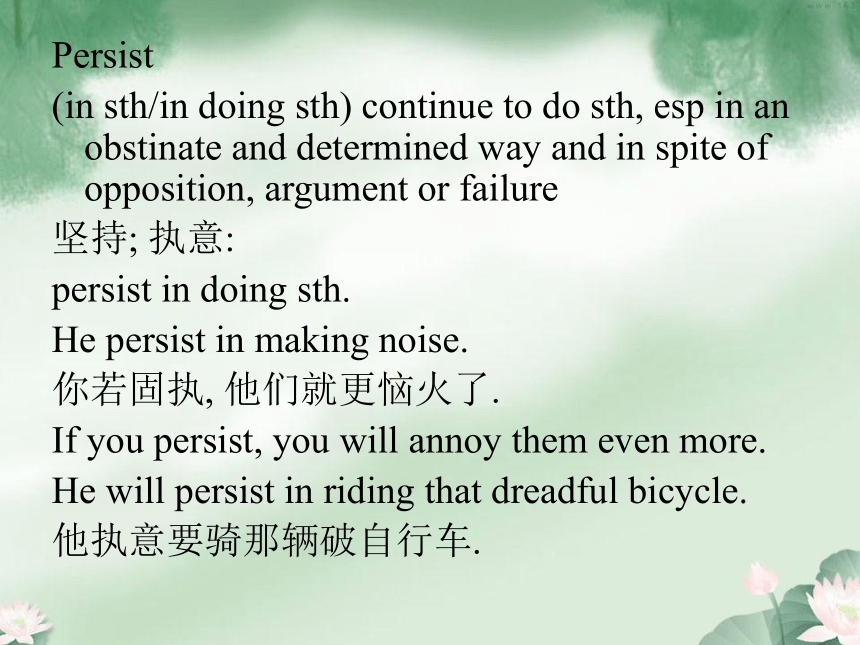
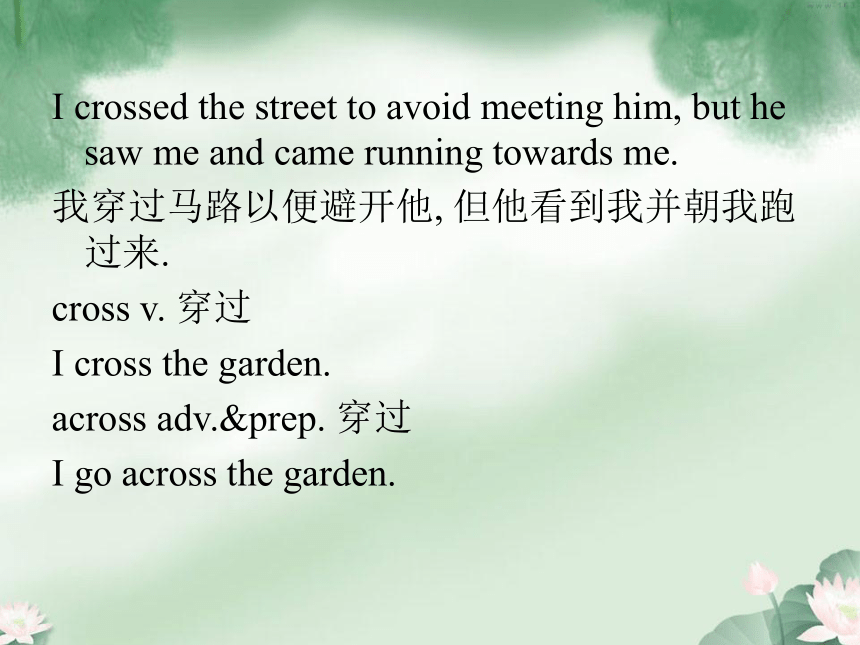
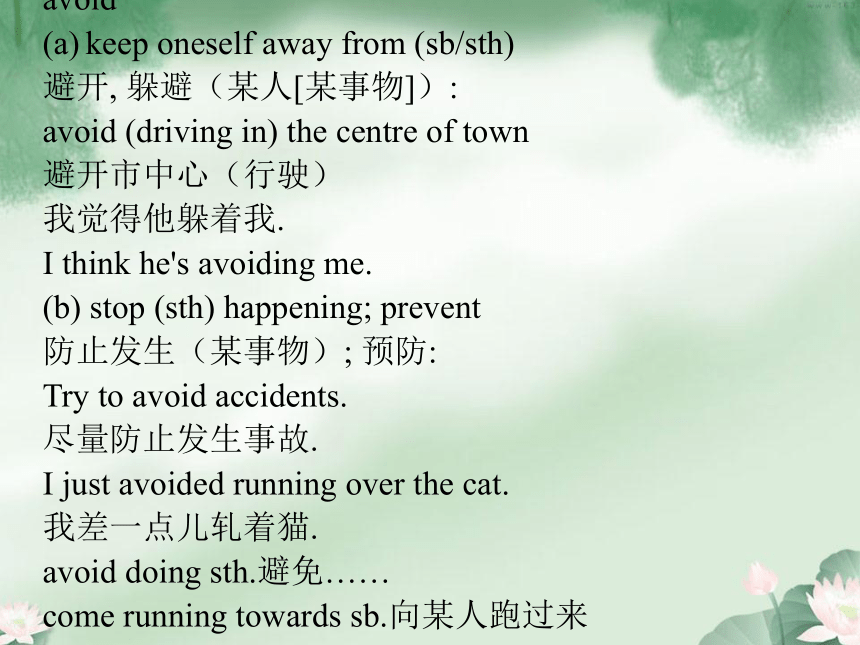
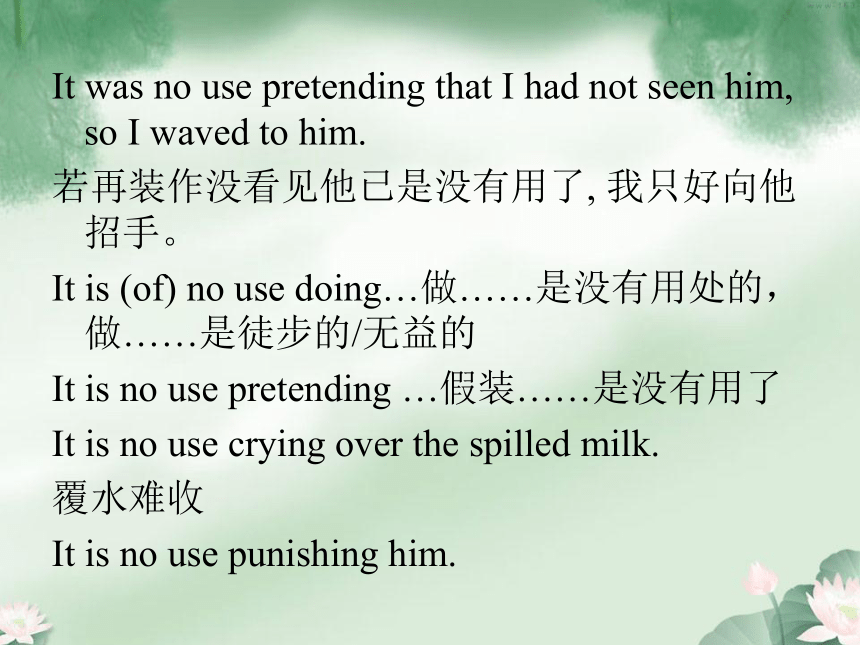


文档简介
(共20张PPT)
Lesson 68
Persistent
There is no lack of beauty in our life, but a lack of discovery.
persistent
continuing to exist or happen, especially for longer than is usual or desirable
持续存在(发生)的
persistent rumours
persistent headaches
a persistent problem
persistent rain
2. continuing to do something, although this is difficult, or other people warn you not to do it
坚持的,执意的
如果她不这么执着,她可能就得不到这份工作
If she hadn‘t been so persistent she might not have gotten the job.
persistent efforts
stubborn adj. 顽固的, 固执的, 坚定的, 坚决的, 难应付的, 难处理的
You are stubborn.
你这个死脑筋
Persist
(in sth/in doing sth) continue to do sth, esp in an obstinate and determined way and in spite of opposition, argument or failure
坚持; 执意:
persist in doing sth.
He persist in making noise.
你若固执, 他们就更恼火了.
If you persist, you will annoy them even more.
He will persist in riding that dreadful bicycle.
他执意要骑那辆破自行车.
I crossed the street to avoid meeting him, but he saw me and came running towards me.
我穿过马路以便避开他, 但他看到我并朝我跑过来.
cross v. 穿过
I cross the garden.
across adv.&prep. 穿过
I go across the garden.
avoid
keep oneself away from (sb/sth)
避开, 躲避(某人[某事物]):
avoid (driving in) the centre of town
避开市中心(行驶)
我觉得他躲着我.
I think he's avoiding me.
(b) stop (sth) happening; prevent
防止发生(某事物); 预防:
Try to avoid accidents.
尽量防止发生事故.
I just avoided running over the cat.
我差一点儿轧着猫.
avoid doing sth.避免……
come running towards sb.向某人跑过来
It was no use pretending that I had not seen him, so I waved to him.
若再装作没看见他已是没有用了, 我只好向他招手。
It is (of) no use doing…做……是没有用处的,做……是徒步的/无益的
It is no use pretending …假装……是没有用了
It is no use crying over the spilled milk.
覆水难收
It is no use punishing him.
pretend
~ (to sb) (that ...) to behave in a particular way, in order to make other people believe sth that is not true:
I'm tired of having to pretend all the time.
Of course I was wrong; it would be hypocritical to pretend otherwise.
We pretended (that) nothing had happened.
She pretended (that) she was his niece.
I pretended to be asleep.
He pretended not to notice.
She didn't love him, though she pretended to.
wave to sb.向某人招手
I never enjoy meeting Nigel Dykes. He never has anything to do.
我就怕遇到奈杰尔 戴克斯. 他从来都是无事可做.
enjoy doing sth.喜欢做……
appreciate sth./doing sth.喜欢做……
用不定式做定语, 修饰anything,不定式放在不定代词后面
anything to do sth.任何要做的事
anything to eat sth.可以吃的东西;
anything to drink可以喝的东西
No matter how busy you are, he always insists on coming with you.
不管你多忙, 他总是坚持要跟你去。
no matter常与how,when,where,what,who等引导的从句连用,译为“无论……”
No matter how old you are,…
No matter where you are,…
No matter who you are,…
No matter how tired you are, your children insisted on listening to stories.
insist
① vt. &vi. ~ (on sth) demand (sth) forcefully, not accepting a refusal
坚持或坚决要求(某事物):
insist on doing sth.坚持做……
我弟弟坚持要和我一起去。
My brother insists on going with me.
他坚持会议的重要性。
He insists on the importance of the meeting.
② vt. &vi. ~ on sth/doing sth require or demand (the specified thing), refusing to accept an alternative
坚决主张/要求,一定要
I insist on speaking to the manager.
My wife insists that I (should) have my hair cut.
I had to think of a way of preventing him from following me around all morning.
我得想办法不让他整个上午缠着我.
think of a way of doing sth.想一个做某事的方法
think of a way of solving
prevent sb. (from) doing sth.阻止某人做某事, 让某人不做某事
stop sb. from doing sth.让某人不做某事
keep sb. from doing sth.让某人不做某事(保持不做某事)
forbid sb. to do sth.禁止某人做某事
Hello, Nigel,' I said. 'Fancy meeting you here!' 'Hi, Elizabeth,' Nigel answered.
“你好, 奈杰尔, 想不到在这儿见到你. “我说. “你好, 伊丽莎白, “奈杰尔回答说。
'Fancy meeting you here!'=Imagine meeting you here!真想不到会在这见到你!(fancy=imagine)
“fancy+名词”表示惊讶
fancy
① vt. 设想,想像
Fancy Ian not knowing the answer to such an easy question!
真想不到伊恩会不知道如何回答这样一个简单的问题。
② vt. 想要,喜欢(往往用于指个人爱好)
天气真好,我想开车去海边。
It’s a fine day and I fancy driving down to the coast.
'I was just wondering how to spend the morning --until I saw you. You're not busy doing anything, are you ‘
“我正不知道怎么消磨这一上午呢, 正好见到你. 你不忙, 是吗 ”
be busy doing sth.忙着做……
反意疑问句的回答, 根据事实回答
'No, not at all,' I answered. 'I'm going to...'
“不, 不忙, 我打算去……”我回答.
'Would you mind my coming with you ' he asked, before I had finished speaking.
“我跟你一道去行吗 ”没等我说完话他就问道.
“Would/Do you mind +动名词/if引导的从句”用来表示客气的请求或征求意见,表示同意/不介意时,用“No, not at all”或“ Certainly not”回答;不同意时往往用一些委婉的说法,如“I’m sorry, but…”等回答,不用“yes, I so”。
Would you mind if I open the windows
Certainly not. /Sorry, but it’s cold here.
mind (sb’s) +doing sth.介意某人做某事-ing的逻辑主语有四种形式,分为两大类
①作为代词, 可以用人称代词的宾格, 又可以用形容词性物主代词
②作为名词, 可以保持本身不变, 也可以变成名词所有格
作主语时必须是所有格(名词所有格, 形容词性物主代词), 但作宾语时可以用所有格, 也可用普通格(人称代词宾格)
Would you mind my parents' having dinner with me
Would you mind me opening the door
Would you mind my/me smoking
Would you mind me making myself at home
你介意我把这儿当成家吗
'Not at all,' I lied, 'but I'm going to the dentist.' ‘
“没关系, 但我准备去牙医那里. “我说了个谎.
Then I'll come with you,' he answered. 'There's always plenty to read in the waiting room!’
“那我也跟你去, 候诊室里总有很多东西可供阅读!”他回答.
Lesson 68
Persistent
There is no lack of beauty in our life, but a lack of discovery.
persistent
continuing to exist or happen, especially for longer than is usual or desirable
持续存在(发生)的
persistent rumours
persistent headaches
a persistent problem
persistent rain
2. continuing to do something, although this is difficult, or other people warn you not to do it
坚持的,执意的
如果她不这么执着,她可能就得不到这份工作
If she hadn‘t been so persistent she might not have gotten the job.
persistent efforts
stubborn adj. 顽固的, 固执的, 坚定的, 坚决的, 难应付的, 难处理的
You are stubborn.
你这个死脑筋
Persist
(in sth/in doing sth) continue to do sth, esp in an obstinate and determined way and in spite of opposition, argument or failure
坚持; 执意:
persist in doing sth.
He persist in making noise.
你若固执, 他们就更恼火了.
If you persist, you will annoy them even more.
He will persist in riding that dreadful bicycle.
他执意要骑那辆破自行车.
I crossed the street to avoid meeting him, but he saw me and came running towards me.
我穿过马路以便避开他, 但他看到我并朝我跑过来.
cross v. 穿过
I cross the garden.
across adv.&prep. 穿过
I go across the garden.
avoid
keep oneself away from (sb/sth)
避开, 躲避(某人[某事物]):
avoid (driving in) the centre of town
避开市中心(行驶)
我觉得他躲着我.
I think he's avoiding me.
(b) stop (sth) happening; prevent
防止发生(某事物); 预防:
Try to avoid accidents.
尽量防止发生事故.
I just avoided running over the cat.
我差一点儿轧着猫.
avoid doing sth.避免……
come running towards sb.向某人跑过来
It was no use pretending that I had not seen him, so I waved to him.
若再装作没看见他已是没有用了, 我只好向他招手。
It is (of) no use doing…做……是没有用处的,做……是徒步的/无益的
It is no use pretending …假装……是没有用了
It is no use crying over the spilled milk.
覆水难收
It is no use punishing him.
pretend
~ (to sb) (that ...) to behave in a particular way, in order to make other people believe sth that is not true:
I'm tired of having to pretend all the time.
Of course I was wrong; it would be hypocritical to pretend otherwise.
We pretended (that) nothing had happened.
She pretended (that) she was his niece.
I pretended to be asleep.
He pretended not to notice.
She didn't love him, though she pretended to.
wave to sb.向某人招手
I never enjoy meeting Nigel Dykes. He never has anything to do.
我就怕遇到奈杰尔 戴克斯. 他从来都是无事可做.
enjoy doing sth.喜欢做……
appreciate sth./doing sth.喜欢做……
用不定式做定语, 修饰anything,不定式放在不定代词后面
anything to do sth.任何要做的事
anything to eat sth.可以吃的东西;
anything to drink可以喝的东西
No matter how busy you are, he always insists on coming with you.
不管你多忙, 他总是坚持要跟你去。
no matter常与how,when,where,what,who等引导的从句连用,译为“无论……”
No matter how old you are,…
No matter where you are,…
No matter who you are,…
No matter how tired you are, your children insisted on listening to stories.
insist
① vt. &vi. ~ (on sth) demand (sth) forcefully, not accepting a refusal
坚持或坚决要求(某事物):
insist on doing sth.坚持做……
我弟弟坚持要和我一起去。
My brother insists on going with me.
他坚持会议的重要性。
He insists on the importance of the meeting.
② vt. &vi. ~ on sth/doing sth require or demand (the specified thing), refusing to accept an alternative
坚决主张/要求,一定要
I insist on speaking to the manager.
My wife insists that I (should) have my hair cut.
I had to think of a way of preventing him from following me around all morning.
我得想办法不让他整个上午缠着我.
think of a way of doing sth.想一个做某事的方法
think of a way of solving
prevent sb. (from) doing sth.阻止某人做某事, 让某人不做某事
stop sb. from doing sth.让某人不做某事
keep sb. from doing sth.让某人不做某事(保持不做某事)
forbid sb. to do sth.禁止某人做某事
Hello, Nigel,' I said. 'Fancy meeting you here!' 'Hi, Elizabeth,' Nigel answered.
“你好, 奈杰尔, 想不到在这儿见到你. “我说. “你好, 伊丽莎白, “奈杰尔回答说。
'Fancy meeting you here!'=Imagine meeting you here!真想不到会在这见到你!(fancy=imagine)
“fancy+名词”表示惊讶
fancy
① vt. 设想,想像
Fancy Ian not knowing the answer to such an easy question!
真想不到伊恩会不知道如何回答这样一个简单的问题。
② vt. 想要,喜欢(往往用于指个人爱好)
天气真好,我想开车去海边。
It’s a fine day and I fancy driving down to the coast.
'I was just wondering how to spend the morning --until I saw you. You're not busy doing anything, are you ‘
“我正不知道怎么消磨这一上午呢, 正好见到你. 你不忙, 是吗 ”
be busy doing sth.忙着做……
反意疑问句的回答, 根据事实回答
'No, not at all,' I answered. 'I'm going to...'
“不, 不忙, 我打算去……”我回答.
'Would you mind my coming with you ' he asked, before I had finished speaking.
“我跟你一道去行吗 ”没等我说完话他就问道.
“Would/Do you mind +动名词/if引导的从句”用来表示客气的请求或征求意见,表示同意/不介意时,用“No, not at all”或“ Certainly not”回答;不同意时往往用一些委婉的说法,如“I’m sorry, but…”等回答,不用“yes, I so”。
Would you mind if I open the windows
Certainly not. /Sorry, but it’s cold here.
mind (sb’s) +doing sth.介意某人做某事-ing的逻辑主语有四种形式,分为两大类
①作为代词, 可以用人称代词的宾格, 又可以用形容词性物主代词
②作为名词, 可以保持本身不变, 也可以变成名词所有格
作主语时必须是所有格(名词所有格, 形容词性物主代词), 但作宾语时可以用所有格, 也可用普通格(人称代词宾格)
Would you mind my parents' having dinner with me
Would you mind me opening the door
Would you mind my/me smoking
Would you mind me making myself at home
你介意我把这儿当成家吗
'Not at all,' I lied, 'but I'm going to the dentist.' ‘
“没关系, 但我准备去牙医那里. “我说了个谎.
Then I'll come with you,' he answered. 'There's always plenty to read in the waiting room!’
“那我也跟你去, 候诊室里总有很多东西可供阅读!”他回答.
同课章节目录
